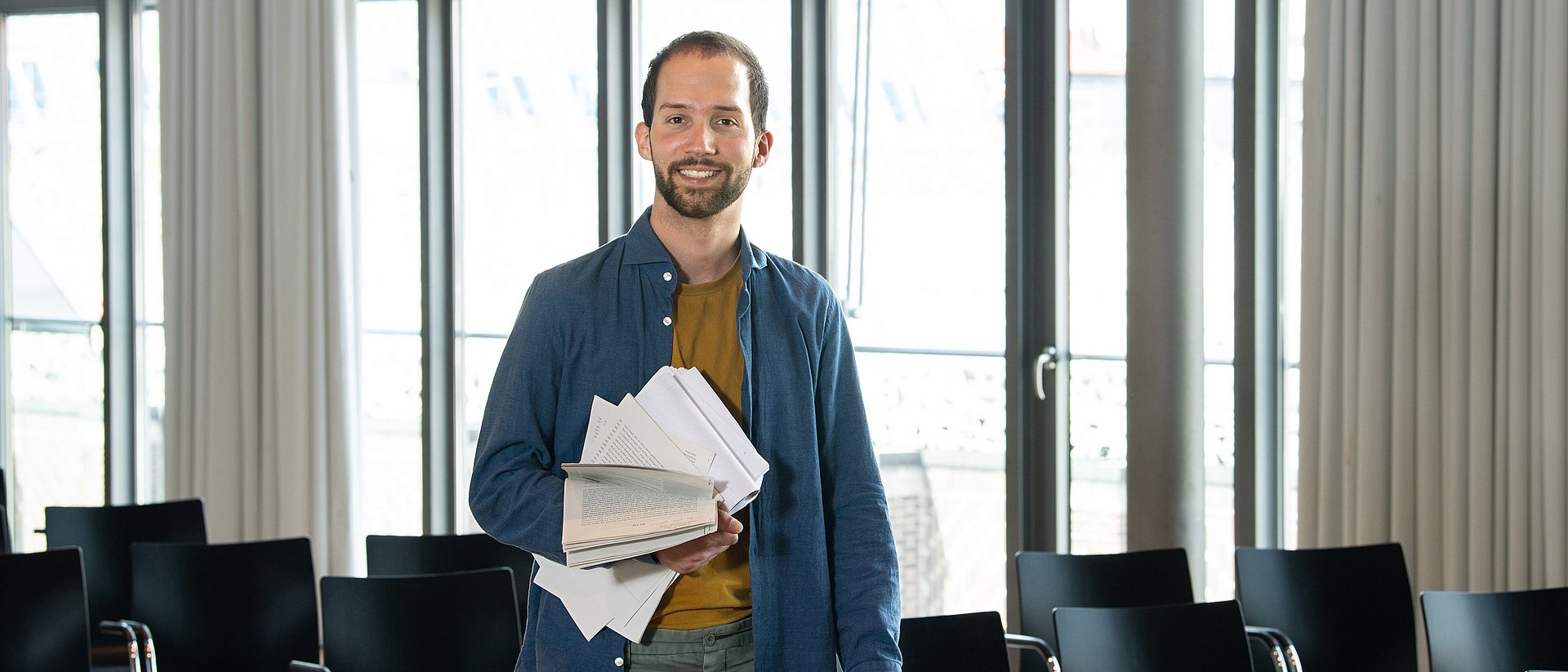Academy of Writing at the Literaturhaus Munich
More than a creative compensation

Yannik Hecher (27) first studied biology and is now in his sixth semester in the master's program “Sustainable Resource Management”. But he doesn’t see himself as a conventional science student.
That may be one reason behind his passion for writing – although it came about more or less by accident. With time on his hands during the lockdown semesters, he simply enrolled in more courses. He discovered the call for applications for the Academy of Writing and applied. “It was the first story I ever wrote,” he says, and adds: “Before that I didn’t have much to do with writing.”
Writing seminars for students
The Academy offers seminars to students at seven Bavarian universities at the Literaturhaus in Munich. For Yannik, it “completely opened up the world of writing.” He got to know it “as an inclusive world open to everyone.”
Despite a lack of experience, the participants could “just write what they liked” and soon found that their texts were “actually quite good”.
Yannik especially appreciated the focus on the written word in the course. Before it began, he received a package with the texts of the other participants and familiarized himself with them without knowing the authors. He found that this made the subsequent feedback session much more honest and helped him to improve his own weak points. At the end of the workshop the young authors received professional elocution training before presenting their texts in a theater in Augsburg.
To be continued
Yannik was born in Berlin and has lived in Munich since the age of 10. His text tells the story of a “grown-up mother’s boy” who falls into a deep depression after the death of his mother. Ironically, the protagonist seeks help in shaking off his “mother’s boy complex” through a birth preparation group.
In fact, explains Yannik, the story is a series of “odd coincidences”. That is what keeps him interested in writing. He is already planning a sequel, but is finding it hard to keep going “without a specific reason or deadline”.
The other course participants and instructors, with whom he still has regular contact, are proving helpful in that regard. But rather than just a work of the imagination, he wants to write a story “with a solid core”. He is doing extensive research into modern masculinity, which plays a central role, and is collecting thoughts from everyday life to further develop the text.
Masters thesis and music
Reading and writing are increasingly becoming a more integral part of his life than ever before. This makes a refreshing change from his studies, where he tends to deal with other topics. His masters thesis relates to “the role of trees in urban oases”.
Yannik also has another “creative outlet” through Quirinello, the band he started with three friends. He plays concerts, records songs and will release a first album in the fall. Yannik is also active as a writer when working with the band. The band's external image on flyers and social media needs catchy words.
Rapid advances in sense of language
Yannik has also noticed that he is getting faster and better at writing in his scientific work at the university – for example in homework assignments. “Even if you don’t always want to be reading what you’re doing all day long at university in your free time,” he says, the focus on writing in general has greatly improved his sense of language. He does not doubt the personal benefits for a moment: “The ability to write is a wonder weapon. You can use it everywhere!”
Yannik believes that he profited from the Academy of Writing. He would advise every student to take part “even in special courses” and “not to be in such a rush with the rest.”
Even technical universities offer all kinds of courses in speaking, debating and languages, he says, and students should make a point of using them. “I would have otherwise missed out on writing.” That would have been a shame. “You don’t have to produce a novel,” he concludes. “Just give it a try.”
- Bavarian Academy of Writing at TUM
- Seminar 2022/23 is entitled "Of Roads and Rest Areas" („Von Straßen und Raststätten“). It is completely held in German.
- The seminar will be led by Juliane Schindler, editor at S. Fischer Verlag, and the author Manuel Niedermeier.
- Application Academy of Writing 22/23 can be submitted up to and including August 01, 2022. Language is German. It must be submitted by post in quadruplicate with a curriculum vitae and all contact details (address, telephone number and email address) to: TUM School of Social Sciences and Technology, Study and Quality Management STS, Dr. Fred Slanitz, Arcisstr. 21, 80333 Munich
Technical University of Munich
Corporate Communications Center
- Nico Kellner / Verena Meinecke
- presse@tum.de
- Teamwebsite
Contacts to this article:
Yannik Hecher
yannik.hecher@tum.de
TUM School of Social Sciences and Technology, Study and Quality Management STS
Dr. Fred Slanitz
slanitz@tum.de